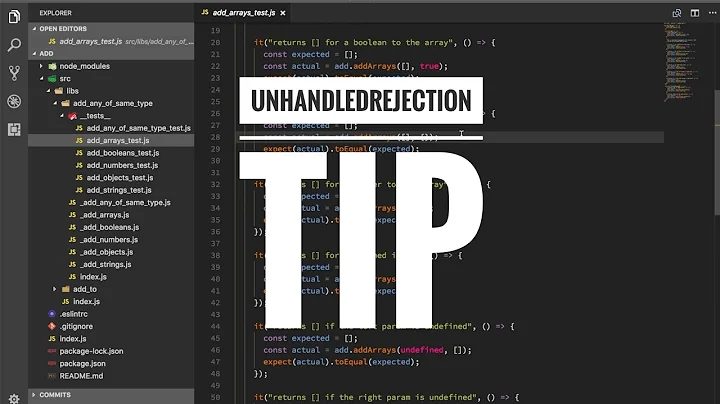Should a Promise.reject message be wrapped in Error?
Yes, it most definitely should. A string is not an error, when you have errors usually it means something went wrong which means you'd really enjoy a good stack trace. No error - no stack trace.
Just like with try/catch, if you add .catch to a thrown rejection, you want to be able to log the stack trace, throwing strings ruins that for you.
I'm on mobile so this answer is rather short but I really can't emphasize enough how important this is. In large (10K+ LoC) apps stack traces in rejections really made the difference between easy remote bug hunting and a long night in the office.
Related videos on Youtube
Dominic
Premature abstraction is the root of all evil. I'm interested in JS, WASM, Rust, Go, blockchain. Pet peeve: People who ask for help but can't be bothered to take the time to write/format a decent question.
Updated on June 06, 2022Comments
-
 Dominic almost 2 years
Dominic almost 2 yearsUsing the native (ES6) Promise. Should I reject with an Error:
Promise.reject(new Error('Something went wrong'));Or should I just reject with a string:
Promise.reject('Something went wrong');And what is the difference in browser behaviour?
-
 Felix Kling over 9 yearsI don't think there is a difference. You simply reject with a value. What that value is and how it is supposed to be processed depends on your application.
Felix Kling over 9 yearsI don't think there is a difference. You simply reject with a value. What that value is and how it is supposed to be processed depends on your application. -
 CodingIntrigue over 9 years@FelixKling MDN does say For debugging purposes, it is useful to make reason an instanceof Error - it doesn't however say why, any ideas?
CodingIntrigue over 9 years@FelixKling MDN does say For debugging purposes, it is useful to make reason an instanceof Error - it doesn't however say why, any ideas? -
 Felix Kling over 9 years@RGraham: Where does it say that?
Felix Kling over 9 years@RGraham: Where does it say that? -
 CodingIntrigue over 9 yearsSorry, on the docs page for Promise.reject
CodingIntrigue over 9 yearsSorry, on the docs page for Promise.reject -
 Felix Kling over 9 years@RGraham: Probably for the reason Benjamin mentions in his answer, to get a stack trace. However, that's a characteristic of
Felix Kling over 9 years@RGraham: Probably for the reason Benjamin mentions in his answer, to get a stack trace. However, that's a characteristic ofError, not of passing anErrorobject to.reject(). The browser or JavaScript still doesn't care what you pass to.reject(). -
Benjamin Gruenbaum over 9 yearsJust like you can throw strings, but shouldn't.
-
 jib almost 9 yearsYou should use
jib almost 9 yearsYou should usenew:Promise.reject(new Error('Something went wrong')); -
 jib almost 9 yearsAlso, in practice, just
jib almost 9 yearsAlso, in practice, justthrow new Error('Something went wrong'));because inside promise-chains and Promise constructor executor functions, this turns into a rejection. -
Bergi over 8 yearsRelated: Throwing strings instead of Errors
-
-
 Dominic over 9 yearsThanks I am also working on large apps glad that someone has had some practical experience with it
Dominic over 9 yearsThanks I am also working on large apps glad that someone has had some practical experience with it -
Benjamin Gruenbaum over 9 yearsIn all honesty? Consider Bluebird, it has better stack traces, typed
catch, and unhabdled rejection tracking which are all killer features for debugging. ES6 promises work well so far only in Firefox in our experience. -
Benjamin Gruenbaum over 2 years2022 update: Don't prefer bluebird, all the changes for debugging have been upstreamed to native promises. (Errors should 100% be wrapped in
new Error())






